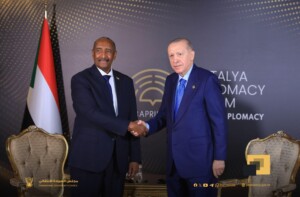Tensions within Sudanese govt continue despite mediation efforts
The tensions between the military and civilian members of the Sudanese government continued yesterday despite efforts to mediate between the two parties to defuse the crisis.
 Volker Perthes met with TSC member Mohamed El Taayshi (SUNA)
Volker Perthes met with TSC member Mohamed El Taayshi (SUNA)
The tensions between the military and civilian members of the Sudanese government continued yesterday despite efforts to mediate between the two parties to defuse the crisis.
Head of the UN Integrated Transition Assistance Mission in Sudan (UNITAMS) Volker Perthes held a series of meetings yesterday with the civilian and military members of the Sovereignty Council.
The meetings held by Perthes included Mohamed El Faki, member of the Unionist Rally in the Transitional Sovereignty Council (TSC) and the current head of the Empowerment Removal Committee*, TSC member Mohamed El Taayshi of the Sudanese Professionals Association (SPA), and leaders of former rebel movements.
Both El Faki and El Taayshi have publicly criticised the withdrawal of the security forces from the Empowerment Removal Committee’s office buildings, leaving the offices vulnerable. The withdrawal sparked a row between the civilian and military components of the TSC.
In a press statement after the meetings, Perthes affirmed the readiness of the United Nations to hold a comprehensive dialogue between the partners of the transitional period. He emphasised the necessity to address issues of political transition through constructive dialogue between partners.
Perthes called on the ruling partners in Sudan to reduce escalation and media exchanges and focus on dialogue and cooperation instead. He stressed the need for cooperation to move forward towards political transition, internal peace, and democracy.
South Sudanese Security Advisor to President Salva Kiir and former mediator of the Sudanese peace negotiations Tut Galuak will visit Khartoum today to attempt to bridge the gap between the two sides and to follow up on the implementation of the Juba Peace Agreement.

Solidarity protests
Khartoum, Red Sea state, El Gedaref, Northern State, White Nile state, Blue Nile state, North Kordofan, and South Darfur witnessed demonstrations of solidarity with the Empowerment Removal Committee yesterday after the joint forces’ guards were withdrawn from their office.
In a press conference at the office of the Empowerment Removal Committee in Nyala yesterday, the South Darfur Revolutionary Emergency Committee consisting of the Forces for Freedom and Change and Resistance Committees called for unity between the various revolutionary bodies to ensure that the constitutional document and peace agreement are implemented accordingly, especially the security arrangements clause.
In Northern State, the revolutionary forces carried out a protest sit-in in front of the buildings of the Empowerment Removal Committee in Dongola in solidarity with the federal committee. They demanded to end the partnership with the military component.
In Rabak, the capital of White Nile State, activists organised a vigil to denounce the powerful position of the military component in the transitional government. The participants in the vigil chanted slogans calling for a civilian government and declared their support for Prime Minister Abdallah Hamdok.
In Khartoum, a crowd of protesters including many members of the Sudanese Professionals Association, Resistance Committees, and other revolutionary groups marched, marched to the premises of the Empowerment Removal Committee and expressed their support for the completion of the democratic transformation process and their dedication to stand up to confront any attempt at ‘blocking the way forward’.
The Resistance Committees in Omdurman, the South Kordofan Resistance Committees Coordination, and a delegation from the professional association of the Kenana Sugar Company also confirmed their support to the Empowerment Removal Committee.
On social media, the military in the Sovereignty Council are criticised directly in various posts. One of them accusies the Sovereignty Council of procrastinating the approval of new laws already approved by the Council of Ministers. Reportedly, the approval of new bills regulating internal security, the justice system reform, the High Constitutional Court, foreign exchange regulations of the Central Bank of Sudan, local government, trade unions, civil aviation, and the restructuring of companies owned by the military is still pending.

Criticism
TSC member Mohamed El Taayshi said that there is no justification for withdrawing the guards from the Empowerment Removal Committee buildings because they are government offices. He explained that withdrawing the forces confused the political scene.
'There is no justification for withdrawing the guards from the Empowerment Removal Committee buildings' – Mohamed El Taayshi
El Taayshi said that the Empowerment Removal Committee is a constitutional institution and was established by a clear law. He called for commitment to the implementation of the Constitutional Document and the Juba Peace Agreement because these are the main guarantors for the completion of the transitional period. He further said that the transfer of power to civilians is very important.
El Taayshi denied the need for an external mediator to bridge the rifts between the partners of the transitional period.
Plundering
The Empowerment Removal Committee in Central Darfur said that the office of the Committee in Zalingei was subjected to plundering yesterday night.
The committee described the behaviour as criminal and said that it is inseparable from the cycle of targeted harassment that the committee is facing in Khartoum and on state level.
The committee also considers the withdrawal of security guards and the subsequent plundering as an event in “the wider series of attacks on the glorious December revolution”.
The committee stated that it counts on its public support and the “lively revolutionary forces that have a real interest in change” to “block the path of those attacking the revolution and its goals”.
'We will defend the government and we will fill the streets in the event of a threat to the democratic transition' – Mohamed El Faki
After the withdrawal of the forces, TSC member El Faki explained that he was not afraid when the guards were withdrawn because he was guarded by “the comradely spirit”. He said: "We will defend the government and we will fill the streets in the event of a threat to the democratic transition. Nobody will frighten us, and we will not allow anyone to relapse or dictate. The access to elections will be guarded by these crowds."
Orders from ‘supreme leadership’
The Police Forces announced all police personnel guarding the offices of the Empowerment Removal Committee on Sunday were under the directives of the country's “supreme leadership”.
The police press office said in a statement that the cancellation of the withdrawal order and return of the guards were both in accordance with the directives of “the higher command”. He indicated that “the same command” assigned the police to secure all the sites from which the other security forces withdrew.
The Empowerment Removal Committee reported that the forces were withdrawn from 22 locations by order of the General Staff of the Sudan Armed Forces (SAF), of which TSC Chairman Lt Gen Abdelfattah El Burhan is the Commander-in-Chief.
*The full name of the committee is the Committee for Dismantling the June 30 1989 Regime, Removal of Empowerment and Corruption, and Recovering Public Funds. It was established by the government of Abdallah Hamdok at the end of 2019 with the aim to purge Sudan of the remnants of the Al Bashir regime. Empowerment (tamkin) is the term with which the ousted government of Omar Al Bashir supported its affiliates by granting them far-going privileges, including government functions, the setting-up of various companies, and tax exemptions.











 and then
and then